When one sips on tender coconut water picked up from a pushcart vendor or sees the glossy fruits and vegetables in the supermarket aisles, one cannot help but wonder what has gone into making these farm products look and taste so attractive. Yet we tamp down these nagging thoughts and enjoy the fruits (literally) of farmers’ labour. But the effort that has gone into the external appearance and relishes the produce not only has an impact on our health but on the environment as well.
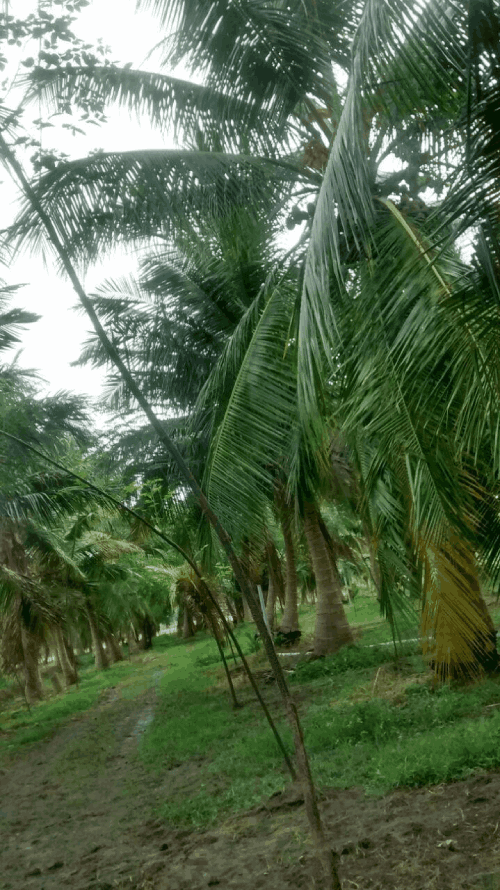
Agricultural productivity and climate change are perhaps two of the most important issues in the modern world. They are also more interrelated than they seem to be. Poor agricultural practices have an impact on the environment and the climate, and change in climate affects the agricultural output. Of late, organic farming has started to gain popularity for its eco-friendliness.
Vidhyasagar Dharmaraj, 34, from the little town of Madukkur in Thanjavur district of the southern Indian state of Tamil Nadu, is one such sustainable green farmer. A marine engineering graduate, he had spent a large part of his life in Germany and Austria. “In Germany, they have only six months of agricultural season, yet manage to produce so much,” he states. “Even though I held an engineering job, I was very interested in observing the way farmers there worked and even today many of my friends over there are farmers. The main difference between people here in India and in Germany in terms of organic farming is in their basic awareness or rather the lack thereof”, he says.
Organic farming limits the use of synthetic fertilisers, pesticides and livestock feed additives. “My main inspiration is Nammalvar”, Vidhyasagar says. The late Dr. G. Nammalvar, an agricultural scientist and organic farming crusader from South India, preached and practised chemical-free agriculture. “I had never met him, but I am inspired by his ideals”, adds Vidhyasagar.
A banned yet prevalent practice in Indian agriculture is stubble (the cut stalk of crop plants left after harvest) burning. A stark reminder is the smog in the national capital Delhi, which gets accentuated by the tonnes of after-harvest burning of stubbles in farm fields around the city and beyond. Farmers adopt this method so that they can clear their fields and cultivate new crops immediately on the same field. In organic farming, however, leaves and other farm discards are allowed to fall and decompose to be later used as compost. Since organic farming is all about recycling farm waste, burning is not an option at all.
Fertilizers and pesticides, as compounds of nitrogen, release nitrous oxide and other toxic by-products during their production, harming the ozone in the atmosphere. Besides, their use in fields also pollutes the soil, impacting its biodiversity. “Earthworms are an integral part of organic farming”, Vidhyasagar notes, “and they cannot survive in an environment polluted by pesticides.” Leguminous plants in crop rotation methods replenish the nitrogen in the soil naturally, eliminating the need for synthetic nitrogenous fertilizers.
“Another important thing about organic farming is that we do not use pesticides, but only pest repellents. This way, the beneficial insects, which require pests for survival, will not die out”, says Vidhyasagar. Instead, he uses Panchakavya, Amirthakaraisal, Jeevamirtham and Agni Asthiram that were used in traditional farming in the decades gone by. Panchakavya is a mixture of five products, the main of which is the urine provided by the native Umbalacheri breed of cow. Amirthakaraisal and Jeevamirtham similarly use a base of cow urine. Agni Asthiram is an insect repellent. These drive the pests away, apart from improving the immunity of the plant.
However, there is the question as to why organic farming is practised by only a small minority and is taking time to catch on. “The main reason is the farm turnout”, Vidhyasagar opines. “Modern agriculture gives higher yields, especially in the initial years, so farmers are attracted to that. Organic farming is also more labour-intensive. Even studies on organic farming differ, some coming to the conclusion that it is not feasible, while others categorically stating that organic farming is the best in the long run.”
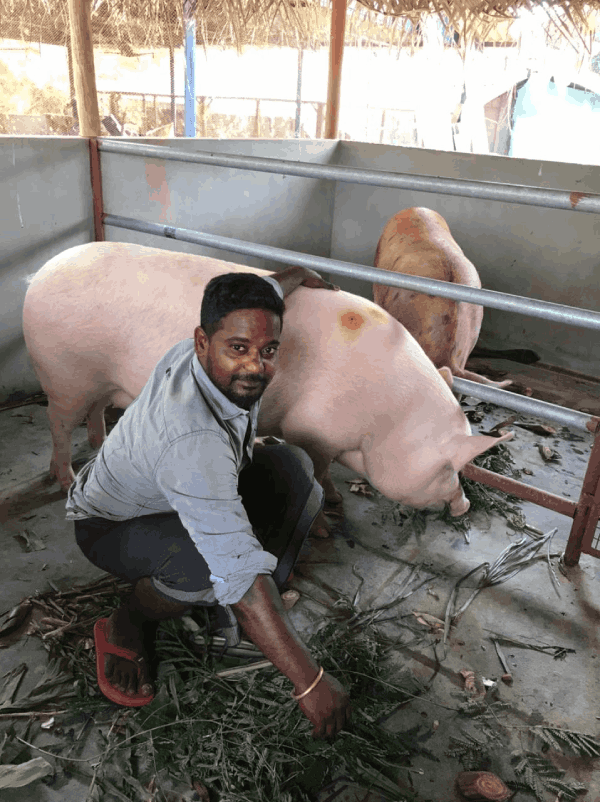
It is for this reason that Vidhyasagar teaches courses at local agricultural colleges. “My main aim is to create awareness. As I said, many people do not understand the need and importance of organic farming. They have their own notions about it. My father, the senior Dharmaraj, started farming 13 years ago, but it had been mostly conventional. It was only after I went abroad that I fully realised the importance of green methods. I keep telling my students to educate and inform as many people as they can”.
In his ten acres of land, he grows grain crops such as paddy and pulses and also nurtures what he calls a ‘mini-forest’ of teak, sandalwood, redwood, silver oak and mahogany for timber, fruit trees like apple, guava, mango, jackfruit and fig. An effort he has been at since 2017. He also rears cattle, goats, pigs, chickens and fish. While crop yield and waste provide fodder for the farm animals, livestock waste provides manure for the field. Fish are particularly useful. A mixture of fish waste and caramelized cane sugar fermented for three weeks called ‘fish amino acid’ is sprayed on plants which repels pests and helps in their growth and survival. A kind of self-reliance within the ecological system.
“Apart from our own use of the farm produce, we provide the remaining to the villagers on demand”, asserts Vidhyasagar proudly. Sustainable farming is the least, he says he can do to reduce his own carbon footprint as well as to provide a healthy alternative of his farm produce to consumers – a classic instance of a warrior’s local effort in making a global impact on assuaging climate change.


Dhurai, 17, is a senior year student in school. A student report at YOCee since his middle school years, Dhurai’s interest lie in photography and sports reporting. He is a keen tennis player and cyclist.

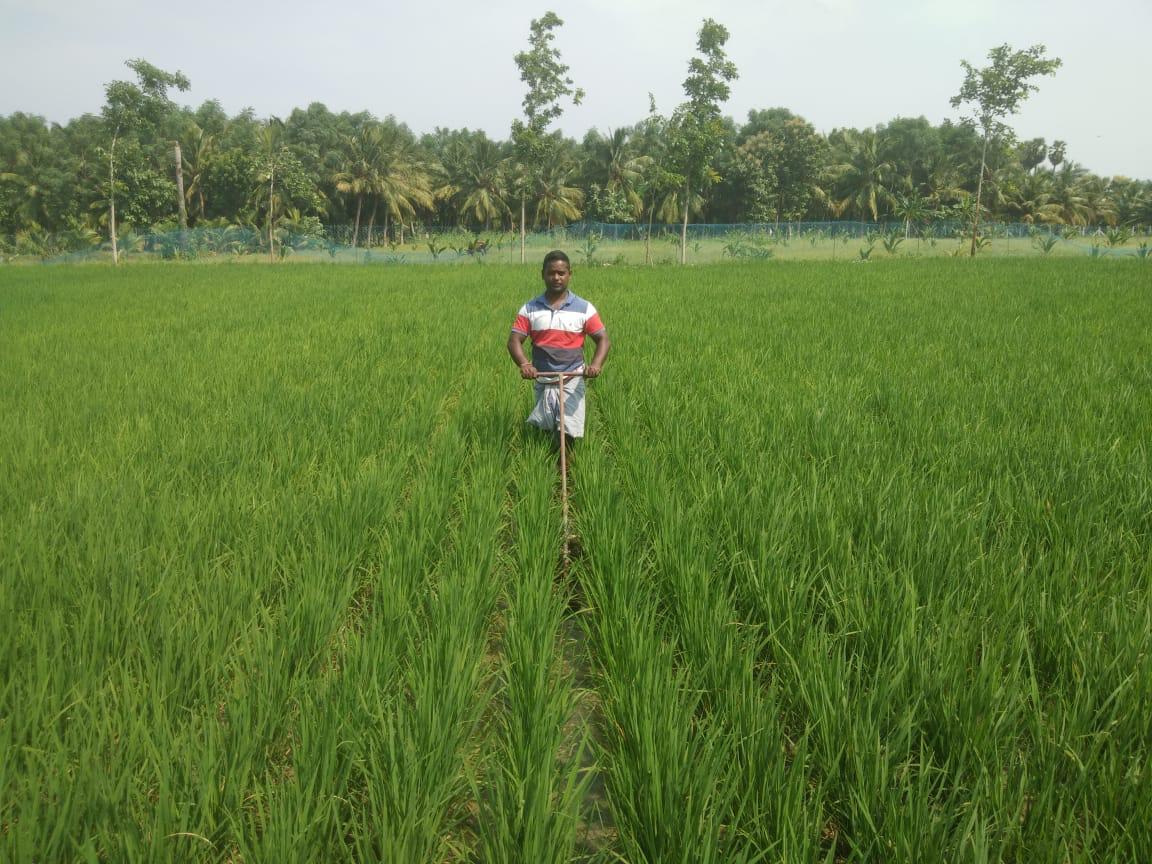
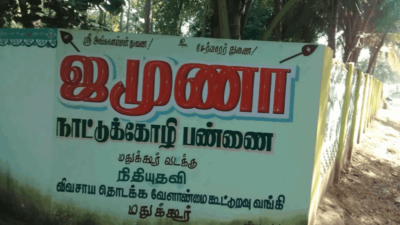
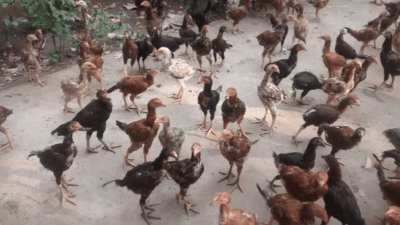
Nice article. Looks like Mr.Vidhyasagar is involved in farming by applying old traditional techniques, which is considered as “organic farming”.
Good thing is knowledge sharing among students and farmers.
Hats of Marine Engineer Vidhyasagar!